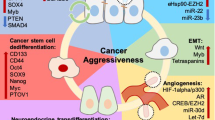Abstract
A prospective study was carried out on a large cohort of males undergoing radical retropubic prostatectomy in order to identify genetic marker regions significantly associated with tumor formation. By comprehensive allotyping of chromosomes known to be associated with prostate carcinogenesis, an algorithm could be formulated for the genetic pathway and a method of discrimination between aggressive and less aggressive forms could be identified.


Similar content being viewed by others
Abbreviations
- AI-:
-
Allelic imbalance
- CaP-:
-
Cancer of the prostate
- LOH-:
-
Loss of heterozygosity
- MSA-:
-
Microsatellite analysis
- Rb-:
-
Retinoblastoma gene
References
Saric T, Brkanac Z, Troyer DA, Padalecki SS, Sarosdy M, Williams K, Abadesco L, Leach RJ, O’Connell P (1999) Genetic pattern of prostate cancer progression. Int J Cancer 81:219–224
Jenkins R, Takahashi S, DeLacey K, Bergstralh E, Lieber M (1998) Prognostic significance of allelic imbalance of chromosome arms 7q, 8p, 16q, and 18q in stage T3N0M0 prostate cancer. Genes Chromosomes Cancer 21:131–143
Dong JT, Boyd JC, Frierson HF Jr (2001) Loss of heterozygosity at 13q14 and 13q21 in high grade, high stage prostate cancer. Prostate 49:166–171
Prasad MA, Trybus TM, Wojno KJ, Macoska JA (1998) Homozygous and frequent deletion of proximal 8p sequences in human prostate cancers: identification of a potential tumor suppressor gene site. Genes Chromosomes Cancer 23:255–262
Knobloch R von, Hegele A, Brandt H, Olbert P, Heidenreich A, Hofmann R (2001) Serum DNA and urine DNA alterations of urinary transitional cell bladder carcinoma detected by fluorescent microsatellite analysis. Int J Cancer 94:67–72
Knobloch R von, Hegele A, Brandt H, Varga Z, Wille S, Kälble T, Heidenreich A, Hofmann R (2002) High frequency of serum DNA alterations in renal cell carcinoma detected by fluorescent microsatellite analysis. Int J Cancer 98:889–894
Acknowledgements
This study was funded in part by grant QLRT-2000–00602 from the 5th Framework Program of the European Union. The complete manuscript of this study has been published in Clinical Cancer Research 2004, 10:1064–1073
Conflict of interest:
No information supplied
Author information
Authors and Affiliations
Corresponding author
Additional information
Summary of article published in Clin Cancer Res (2004) 10:1064–1073
Rights and permissions
About this article
Cite this article
von Knobloch, R., Konrad, L., Barth, P.J. et al. Genetic pathways and new progression markers for prostate cancer defined by microsatellite allelotyping. Urologe 43 (Suppl 3), 149–152 (2004). https://doi.org/10.1007/s00120-004-0611-9
Published:
Issue Date:
DOI: https://doi.org/10.1007/s00120-004-0611-9




